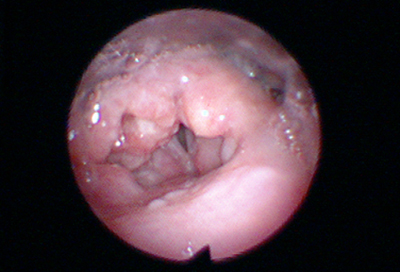Summary
Definition
History and exam
Key diagnostic factors
- presence of risk factors
- age >40 years
- hoarseness
- dysphagia
- odynophagia (painful swallowing)
- cervical lymphadenopathy
- supraglottic or glottic mass
- lesional erythroplasia, ulceration, necrosis, or bleeding
- signs of airway obstruction
- haemodynamic instability
Other diagnostic factors
- sore throat
- otalgia
- middle ear effusion
- stridor
- weight loss or cachexia
- general distress
- oral and pharyngeal masses or leukoplakia
- loss of laryngeal crepitus
- parotid and thyroid growths
- diminished breath sounds
Risk factors
- tobacco use
- alcohol use >8 units/day
- history of radiotherapy
- black ethnicity
- male sex
- vocal fold dysplasia
- GORD
- achlorhydria
- family history of laryngeal cancer
- Agent Orange exposure
- human papillomavirus (HPV) infection
Diagnostic investigations
1st investigations to order
- neck CT with contrast
- chest CT with or without contrast
- MRI with and without contrast
- fine needle aspiration of neck mass
- flexible fibre-optic laryngoscopy
Investigations to consider
- rigid videostroboscopy
- rigid direct laryngoscopy
- immunohistochemistry testing
- laryngeal biopsy
- whole-body PET/CT scan
- fluorescence endoscopy
Treatment algorithm
glottic or supraglottic
subglottic
treatment not effective/appropriate
Contributors
Authors
Matthew Pierce, MD
Otolaryngologist
Otolaryngology, Head and Neck Division
MedStar Washington Hospital Center
Georgetown University
Washington
DC
Disclosures
MP declares that he has no competing interests.
Acknowledgements
Dr Matthew Pierce would like to gratefully acknowledge Dr Scott V. Larson, Dr Hari Deshpande, Dr Elina Kari, Dr Amy Chen, and the late Dr Clarence Sasaki, previous contributors to this topic.
Disclosures
SVL, HD, EK, and AC declare that they have no competing interests.
Peer reviewers
Alfio Ferlito, MD, DLO, DPath, FRCSEd
Director
Department of Surgical Sciences
Professor and Chairman
ENT Clinic
University of Udine
Udine
Italy
Disclosures
AF declares that he has no competing interests.
Steven J. Charous, MD, FACS
Assistant Professor
Department of Otolaryngology
Rush University Medical Center
Chicago
IL
Disclosures
SJC declares that he has no competing interests.
Peer reviewer acknowledgements
BMJ Best Practice topics are updated on a rolling basis in line with developments in evidence and guidance. The peer reviewers listed here have reviewed the content at least once during the history of the topic.
Disclosures
Peer reviewer affiliations and disclosures pertain to the time of the review.
References
Key articles
National Comprehensive Cancer Network. NCCN clinical practice guidelines in oncology: head and neck cancers [internet publication].Full text
Forastiere AA, Ismaila N, Lewin JS, et al. Use of larynx-preservation strategies in the treatment of laryngeal cancer: American Society of Clinical Oncology clinical practice guideline update. J Clin Oncol. 2018 Apr 10;36(11):1143-69.Full text Abstract
American College of Radiology. ACR Appropriateness Criteria: retreatment of recurrent head and neck cancer after prior definitive radiation. 2014 [internet publication].Full text
Reference articles
A full list of sources referenced in this topic is available to users with access to all of BMJ Best Practice.

Differentials
- Laryngitis
- Fungal laryngitis
- Sarcoidosis
More DifferentialsGuidelines
- Suspected cancer: recognition and referral
- NCCN clinical practice guidelines in oncology: head and neck cancers
More GuidelinesPatient information
Stopping smoking
More Patient informationLog in or subscribe to access all of BMJ Best Practice
Use of this content is subject to our disclaimer